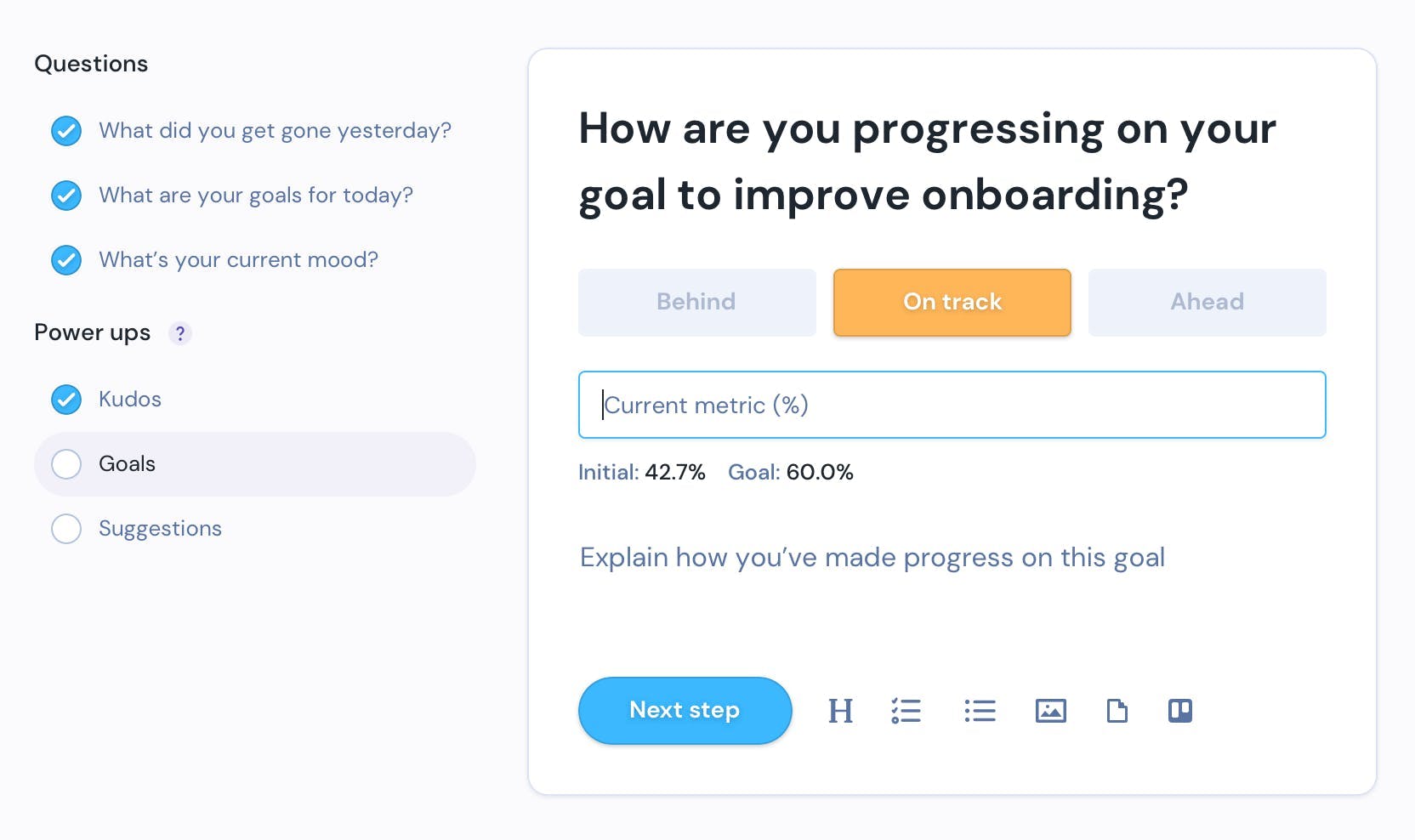Goal Setting Guide: Use Goals to Improve Your Work & Life

The ambitious among us know how hard committing to long-term goals can be. Try as you might, it does sometimes seem impossible to make real progress. In the event of a failure, you might chalk it up to distractions, other responsibilities, time limits or a good helping of procrastination, but what if I told you that you had set those goals inefficiently? Or what if I said that the only thing you’d really set was yourself, up for failure?
Goal-setting theory believes that proper formulation of effective goals has a direct influence on your achieving of them, not too dissimilar from the “If you build it, he will come” mantra in late-80’s classic movie Field of Dreams.
Scientists now agree that the brain uses 20% of our total energy, suggesting it’s usually up to quite a bit of thinking. The secret to goal-setting is to optimize the way in which we perceive our goals – a sort of psychological optimization – as means to implement more productive attitudes.
If you set a goal, it’s more likely to happen.
What Is The Goal-Setting Process?
Setting goals is the exhilarating act of attempting to transform the intangible and unknowable into the measurable and achievable. When done right, it allows you to commit focus, evaluate progress and adjust a plan as needed. There are some basic steps to follow:
Step 1: Identify your goal
If you closed your eyes, spun around 15 times and were then asked to point to the door, could you do it? Likewise, there’s little chance you’re going to have success with goal-acquisition if you are blind to the actual thing you want to achieve. As Locke & Latham wrote, in a 2013 work , “a specific, high goal leads to a higher performance than no goal, or an abstract goal such as to do your best.”
The first step towards greatness is to identity this specific goal, the rationale behind doing it and the potential benefits of completing it; treat your goals to some full-on analysis. Once you’ve convinced yourself something is worth doing, avoid vague terminology (“do your best”) and instead have yourself aim for an explicit, quantifiable statement.
In Goal Setting, project management specialist Michael Dobson (et al) poses a striking question to determine whether an action is goal-critical. He writes that “criteria often used to rank concerns are importance and urgency*. With regard to importance, consider the impact of each concern on your goals... What kind of an effect will this activity have on your reaching your goals?”
* If you’re interested in learning about the difference between “urgent” and “important” tasks, consider reading up on the Eisenhower Matrix
Step 2: Break down your goal into smaller parts
There exists the old mantra, “a problem shared is a problem halved,” but how about a problem halved is a problem... well, halved. Break your beefy, long-term goal into smaller goals and alter the perceived difficulty of the larger project.
By changing your perception, you can temporarily trick yourself into focusing on these smaller tasks, which seem very doable, instead of worrying about the daunting entirety of the project.
For example, the goal “lose weight” isn’t specific, meaning it’s hard to gauge direction. Alternatively, “lose 2 pounds a week” or “go to the gym 10 times this month” are measurable and seem a lot easier, even though they are both working towards the same ambition.
Step 3: Set deadlines for your goals
Procrastination is the poison that taints your productivity, and deadlines just may be the cure. The Yerkes–Dodson Law outlines the unbreakable bond between pressure and performance, in essence summarising that we experience an enhanced work rate when we feel pressured, such as when we’re working to meet an impending deadline.
Similarly, in a 2018 study, Professor Meng Zhu coined the “mere urgency effect,” the theory that tasks considered to be urgent elicit greater attention as these opportunities are viewed as soon to be gone, regardless of whether their impact or significance is greater than less-urgent jobs. Setting yourself a deadline is a clear, constant reminder that allows you to determine how much energy or resources you’ll need to allocate in order to meet the time limit. Ideally, you should set deadlines for every goal you have.
Step 4: Write down your goals
Just as a deadline is a mental reminder of your responsibilities, writing down your goal in a visible place, where you will see it every day, acts as a physical prompt. They increase your awareness of your goals, giving yourself a greater number of chances to self-motivate.
Whatever your note-taking medium is, be it sticky notes, whiteboard, digital planner or notebook, these messages effectively allow you to be your own coach with reliable encouragement to do better and be more productive. A second consequence of writing things down is that a fluffy dream that’s been happily floating around in your head suddenly becomes very real and clear.
Step 5: Review your goals every day
As people, we are rather fond of positive reinforcement and there’s no reason you shouldn’t be congratulating yourself when you’ve accomplished a task relevant to your goal. Review your goals every day to make sure that you are on track, rewarding yourself for positive behaviors and healthy habits.
Goals need to be reviewed regularly to ensure they remain in alignment with your current values and priorities; they need to continue to be relevant as your desires and ambitions develop.
Not only might your motivations change, but you could also realise that you’ve set an objective that you cannot achieve, either through underestimating the difficulty/scope or overestimating your abilities/resources. Regular review can catch these unhelpful goals, allowing you to substitute them for better, more practical endeavours.
An added benefit of using a digital interface for goal setting is that users can take advantage of more refined structures, just like Friday's goal software, which let users set goals, make comments/amendments and evaluate progress.
What is Goal-Setting Theory?
Goal-setting theory suggests that people can achieve various feats by setting effective goals, and that people are more likely to achieve their goals when they have a suitable action plan.
In A Theory of Goal Setting & Task Performance, Edwin Locke and Gary Latham explain that “goal setting theory is based on the simplest of introspective observations, namely, that conscious human behavior is purposeful... [thus] the domain of goal setting theory lies within the domain of purposefully-directed action.”
In simpler terms, goal-setting theory is concerned with the relationship between goal and motivation, whereby the very act of goal-setting can positively influence the acquisition of said goal.
“The theory focuses on the question of why some people perform better on work tasks than others,” Locke and Latham continue, “If they are equal in ability and knowledge, then the cause must be motivational.”
Goal-setting theory helps in numerous settings. For example, within education, where students are oftentimes barraged by many targets at once, the theory allows students to prioritise their goals and track their achievement, nurturing an underlying love and appreciation for learning (higher grades!). In business scenarios, goal-setting allows both employers to motivate their workforce and employee to set goals relevant to their career ambitions.
By applying some goal-setting theory, you too can learn how better to focus on your highest-priority targets and form plans for achieving the most ambitious of undertakings!
What Skills Does Goal Setting Require?
Aside from a generous sprinkle of aspiration, there are three core skills that goal-setting requires to be successful at work:
- Conceptual Thinking: typically, you start a long distance from your goal, with many obstacles and complications between. In order to enact useful, viable goal-setting practices, individuals must first understand the situation, using their ability to think critically. Without this skill, you will not be able to develop your goals, or convert them into smaller, more manageable parts. If you do not know how to turn an ambition into actionable steps, it will be impossible to get anywhere.
- Planning/Organization: You simply cannot achieve any significant, long-term vision without the necessary preparations and consistent planning. An unplanned endeavour is like trying to cross a lake in a rowboat with no paddle... You may luckily drift somewhere near, but there’s no way you’re getting anywhere soon. Likewise, a huge portion of time-waste can be avoided by adhering to simple organizational practices, such as a dedicated space for work, or ensuring you store your data or files efficiently.
- Self-Motivation: Also called willpower, this skill is notoriously difficult to measure. Obviously, if you’re not motivated, you won’t attain your goals, but self-motivation can absolutely be learned and refined. Much of the time, motivation is dependent on an individual’s self-efficacy, one’s belief in oneself that they have the ability needed to complete a task (more on this later).
When you’re setting goals, you should always consider your motivation for doing it; if you can’t see sufficient reason (output, gain, results), or if there seems too little value within those reasons, think twice about investing in such a pursuit?
Aside from these goals, there are numerous other skills that will be favorable to any kind of work, including determination, resilience, and creativity.
However, don’t forget that goals are influenced by external factors, too. According to Victor Vroom’s Expectancy Theory (1964), “motivation also is influenced by the employee’s perceived chances of getting various outcomes as a result of accomplishing his or her performance goal.”
How do you set effective goals? Be S.M.A.R.T
Although there have been numerous variations that attempt to reinvent goal-criteria systems, there seems to be no replacement for the old, reliable SMART goal, meaning specific, measurable, attainable, relevant and time-based--especially for professional goals.
- S=Specific
- M=Measurable
- A=Attainable
- R=Relevant
- T=Time-Based
Your goals should be specific, otherwise you won't truly be able to focus or know how to plan your next steps.
In a similar fashion, goals are best when they’re measurable, as you can visibly track progress, maintaining a clear picture of where you stand in the process. It’s obvious when you have achieved a measurable goal, meaning there’s a clear moment for reward.
Furthermore, your goals need to be attainable, because even the best of intentions are damaging for self-confidence and goal-acquisition when they aren’t reflective of your abilities/resources, ultimately leading to discouragement.
Goals have to be relevant to your values, long-term plans and grander ambitions. In this way, goals completed can inform subsequent goals, resulting in a productive chain of achievements that steadily nudge you towards success.
Finally, make sure that your goals are time-based, for the aforementioned reasons on deadlines, most significantly that it’s vastly more probable you’ll complete something when you’ve assigned a time-limit to it. An example of a SMART goal: "I will lose 20 pounds by April 1st." Also notice the positive affirmation (I will), a language trick proven to influence your motivation and the likelihood of extended goal-commitment.
More Notes On Goals
Without the use of any punchy acronyms, we can still differentiate between goals, most commonly by the metric they are measuring:
· Time: As you’re aware, goals are either short-term or long-term. Short term goals are usually time-bound, having a very short time frame (ship order by 4pm tomorrow afternoon). Long-term goals may have a specific date by which they must be achieved, but they don’t necessarily require deadlines; instead, they can be process-goals (study for 1 hour every weekday evening) with undefined end-dates.
· Focus: goals are either seriously big objective, the life-changing milestones you gradually work towards, falling into the long-term; conversely, short-term goals can work with limited focus, as in something quick that you want to achieve, not necessarily a prerequisite of your long-term ambitions. These often materialise as topic-based goals, such as health, where you might want to “cycle 5km every day” (this isn’t technically a long-term goals, but rather a series of repeating short-term tasks... the long term goal would be improved fitness or cycling proficiency)
Examples of Good Goals
Of course your goals are unique to you, and manifest in multiple aspects of your life, not merely work but also home, family, love, education, health, et cetera. Though, just for example, let’s zoom in on a sales context, which might have goals that look a little like these:
1. Meet with 10 new prospects a week (Time-based and measurable)
2. Establish three new relationships with key decision makers each week (Quantified and specified)
3. Close two new deals each month (Achievable and Relevant)
Don’t limit yourself to just professional goals. Goal-setting theory is a general approach that simply argues an affirmation to do something increases the chance of getting it done, thus goal-setting can be introduced at home, too!
Goals Should Challenge You
Don’t be afraid to challenge yourself, not only to see what you can accomplish but also to practice and improve self-efficacy. Locke and Latham (1991) report that “in addition to affecting performance directly, self-efficacy can affect it indirectly by affecting personal goal choice and commitment to assigned goal.” They go on to say those that assign themselves challenging goals improve their self-efficacy, since doing so is, itself, an expression of confidence.
In other words, the boost to self-confidence, earned by completing a particularly challenging goal, established higher self-efficacy, thus promoting the setting of further challenging goals. In much the same way, a 2001 text from A. E. Schwartz & Associates reminds to “set yourself up for success by choosing long-term attainable goals,” and to “start with small steps, especially in areas that are difficult for you.”
How To Use Friday For Goal-Setting
Friday integrates goal-setting software directly into our simple-to-use planner and operating system.
With Goals in Friday, you can:
- See key success metrics you’re trying to achieve for more focused productivity
- Share progress and provide context to key stakeholders to spend less time in meetings
- Know how the whole organization is doing with all goals in one view
- Connect goals to your everyday work. Strategy in action!

Final Thoughts on Goals & Goal-Setting Theory
Goal-setting theory is exactly that... a theory. In reality, everyone has unique ambitions, passions and work ethics. However, as a practical exploration into the relationship between goals and achievement, take from it what you will.
Curious as it may have sounded, we’ve now seen that the way in which you set goals has a potentially huge impact on your goal-commitment and target-acquisition. By changing the landscape on which you formulate goals, you can set yourself up, not for failure but brilliant success.
So go and take your newfound goal-setting skills with you. Dream big, but plan bigger!

